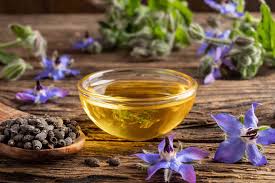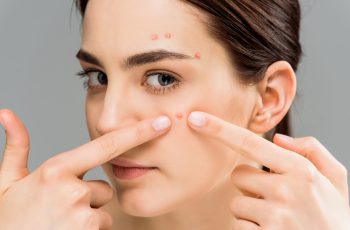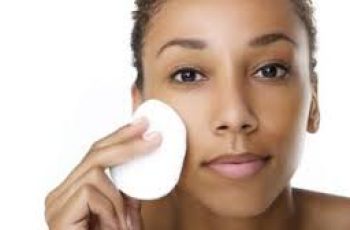
Borage Seed Oil in Skin Care
Borage seed oil is an extremely common and safe ingredient in skin care.
It has a luxurious feel and is found in many expensive face creams.
It has been used by civilizations for millennia for its versatility in medicine and cosmetics.
It is safe for use on the face, during pregnancy, and on baby skin. It should only be avoided by those with extremely dry skin. Take the Baumann Skin Type quiz to make sure you only buy the right products for your skin type.
Take the Quiz
Table of contents
what is borage seed oil
What is borage seed oil?
Borage seed oil (Borago officinalis) comes from a wildflower also known as “starflower.”
It has been used for over 1,500 years for its various beneficial properties(2) and it is still used today in many skin care products.
Mentions of borage oil date as far back as Roman historian Pliny the Elder and the Greek poet Homer, who described a substance he called “nepenthe.”
Nepenthe is now believed to have been derived from borage leaves steeped in wine(3).
A medicinal tea made of borage leaves was also commonly consumed in the Middle Ages(2).
Borage seed oil contains high levels of beneficial fatty acids that give it many useful properties in skin care.
Is borage seed oil used in skin care?
Borage seed oil is a very common ingredient in skin care, found in product types like:
Cleansers
Lip balms
Masks
Moisturizers
Sunscreens
Toners
Here are some of my favorite borage seed oil products. To find out if Borage seed is is right for your skin, be sure to shop by your Baumann Skin Type.
Take the Quiz
Borage seed oil in skin care
What kind of oil is borage seed oil?
Borage seed oil is primarily composed of unsaturated fats and it is derived from a wildflower.
Though it is a plant extract, it is not an essential oil because it is too thick. It is instead considered a carrier oil in many cosmetics.
Borage seed oil is cold pressed and typically unprocessed by chemicals. For those reasons it is usually considered an organic oil.
What are the active compounds in borage seed oil?
Linolenic acid
Borage seed oil is rich in gamma-linolenic acid, a fatty acid that helps the production of ceramides.
Linolenic acids aren’t naturally synthesized in your body, so they have to be consumed in your diet or with skin care.
Borage seed oil has been shown to have two to three times more gamma-linolenic acid than evening primrose oil, which itself is known to be a rich source of the essential acid (6,7).
Many common vegetables, nuts, and seeds part of most diets contain linolenic fatty acids.
Oleic Acid
Oleic acid is also an active fatty acid in borage seed at around 18.5% concentration (depending on factors like where the plant was grown, soil conditions, etc.)
Oleic acid’s interactions with the skin, creating tiny holes on the skin, helps many ingredients or compounds absorb into the skin.
Many antioxidant, free radical eliminating properties are also present in borage seed oil.
Linoleic acid
Borage seed oil also has a high concentration of linoleic acid, a soothing, anti-inflammatory fatty acid desirable in many types of products.
side effects of borage seed
Side effects
Borage seed oil has a decent amount of oleic acid, which, just like in olive oil, creates small perforations in the skin which can irritate dry skin type.
The only other possible side effect from use of borage seed oil is a mild allergy to it.
Be sure to check ingredient labels for all of your known allergens if you are concerned about having a skin reaction.
Is borage seed oil safe?
Borage seed is an extremely safe ingredient for use in skin care.
The EWG safety rating for borage seed oil is “1,” with zero associated safety concerns in their data.
Borage seed and oils derived from it were also shown to be safe by the Cosmetic Ingredient Review (CIR) in 2010 (19).
The CIR reported that repeated long time exposure to borage seed oil showed no signs of irritation in topical use (20).
The only danger is it might not be right for your Baumann Skin Type or you might be using it in the wrong step in your custom skin care regimen.
Take the Quiz
benefits of borage seed oil
What are the benefits of borage seed oil?
Five important benefits of borage seed oil:
anti-microbial
anti-redness
hydrating
occlusive
penetration enhancer (Increases absorption of other products)
Borage seed oil has a remarkable amount of versatility and many benefits in skin care products.
To begin with, it is an anti-microbial oil which means it has uses in eliminating acne causing bacteria on the skin.
It is occlusive, meaning it helps regulate the absorption of other ingredients into your skin based on how you layer your skin care products.
Borage seed is rich in hydrating fatty acids which moisturize and revitalize the skin.
Soothing linoleic fatty acid is also present in the oil, meaning it is great for treating inflammation and relieving redness.
It also contains oleic acid, a fatty acid which further assists with ingredient absorption and is recommended for many skin types.
Just as importantly, borage seed oil contains extremely high amounts of the beneficial fatty acid, gamma-linolenic acid (GLA).
Borage seed oil is so versatile that it is even used with success in treatments of arthritis (22,24,25).
Borage seed oil for skin lightening
With a high concentration of unsaturated fatty acids, borage seed oil is a weak tyrosinase inhibitor.
Tyrosinase inhibitors directly interrupt the skin’s production of melanin, the pigment that darkens skin.
Weak tyrosinase inhibitors are commonly used alongside PAR-2 blockers like niacinamide or powerful tyrosinase inhibitors like resorcinol.
If used to treat melasma or other types of hyperpigmentation, it should be combined with other skin lightening ingredients.
slide 1 of 1
Nuxe Oils 50 ml Nuxe Huile Prodigieuse Florale Multi-Purpose Dry Oil – Skin Type Solutions
Nuxe Huile Prodigieuse Florale Multi-Purpose Dry Oil
₫
757,000
See Product
Borage oil in moisturizers
Borage seed oil is occlusive, which means it creates a kind of “shield” on top of skin which can help modulate how your other skin care ingredients are absorbed.
Skin care ingredients will have different effects based on the order they are layered on your skin.
This is why when you use borage seed oil in your skin care regimen is important.
Occlusive ingredients work extremely well in combination with retinoids, which often need to have their absorption rates modulated based on your particular skin concerns.
Occlusives are used for treatments like skin slugging.
To find out when to use borage seed oil face creams in your skin care routine- take the dermatologist- developed skin care routine quiz.
Borage oil for Hair repair and hydration
As a non-comedogenic, hydrating oil, borage seed oil is safe for use in hair care and does not pose a risk of clogging pores on the hair line.
Borage seed has many desirable qualities that keep hair healthy and shiny.
As an emollient, borage seed oil can help hair reflect light, making it appear to shine.
Oils that both hydrate hair strands and repair follicles are very desirable in hair care products.
borage oil for specific conditions
Borage seed oil for specific conditions
Depending on your Baumann Skin Type, borage seed oil can be used to treat myriad skin conditions and concerns like wrinkles, hyperpigmentation, and acne.
The many beneficial fatty acids and other active compounds present in borage seed oil can be found in almost every style of skin care product.
Acne
Borage seed oil is anti-microbial (26) and non-comedogenic, which makes it great in use for acne products.
Acne is caused by a buildup of specific acne-causing bacteria clogging facial pores; this means most ingredients that eliminate bacteria without further clogging pores can be useful in acne products.
There are many effective routines and products containing borage seed or similar oils for use with acne.
To find out if borage seed oil is right for your acne routine, be sure to shop by your Baumann Skin Type.
For dry skin
If you have dry skin, borage seed oil might not be right for your skin type as it has a high concentration of oleic acid, which can dehydrate or irritate extremely dry skin.
The best oils for dry skin types contain linoleic acid, which borage seed oil does have, but there are other oils with a higher amount of this fatty acid and are better for dry skin.
This is a great example of why finding the best serums or type of moisturizer for your skin type can be tricky.
If your skin is not “extremely” dry, there is a chance borage seed can still be right for your skin type when combined with other oils.
Because of the high concentration of oleic acid, dry skin conditions like eczema, or psoriasis should not be treated with borage seed oil.
borage oil for rosacea
Rosacea
Borage seed oil is a a good calming oil for rosacea, It has anti-redness properties and feels soothing.
Argan oil is another great oil to use to treat rosacea.
If you have rosacea, it is very important that every product in your skin care routine is safe for rosacea-prone skin.
Wrinkles
Anti-aging products for wrinkles often contain borage seed oil.
Borage seed oil contains antioxidants which directly aid in repairing sun damaged, aging skin types.
Borage seed oil can be found in anti-aging creams alongside other common anti-aging ingredients in the retinoid family.
When starting an anti-aging regimen, it is important to note that antioxidants do not treat wrinkles- they help prevent them.
You should combine borage seed oil with other antiaging ingredients.


